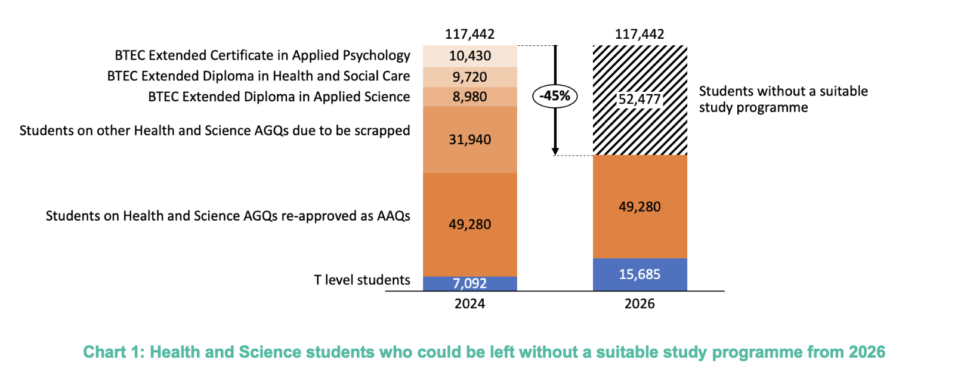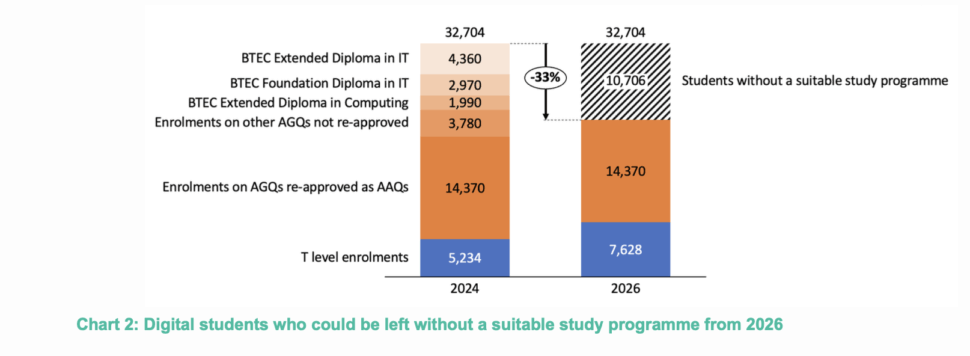Tens of thousands of youngsters are at risk of falling through a “qualifications gap” in key areas of the economy because of the government’s plan to scrap BTECs, campaigners estimate.
In December 2024, the Department for Education announced a future blanket ban on all diploma and extended diploma size applied general qualifications (AGQs) – courses equivalent to two and three A-levels respectively – in T-level subjects.
Ministers’ aim is to “direct” students away from AGQs to T-levels – new courses dubbed to be the technical equivalent to A-levels.
It means popular AGQs like BTECs in subjects such as health and social care, applied science and IT will be scrapped in 2026, with “highly regarded” AGQs in business and engineering due to follow in 2027.
The government’s “optimistic” forecast is that just 91,200 students will be studying a T-level in 2027 – up from 41,589 learners in 2025. There are currently 277,380 students studying an AGQ.
New analysis by the Protect Student Choice campaign indicates that the bonfire of AGQs will lead to 52,000 fewer young people studying health and science courses each year, a reduction of 45 per cent.
And there will be 11,000 fewer young people studying digital courses each year, a fall of 33 per cent, according to the report.
Government priority areas to be hit
Life sciences and digital and technologies are two of the eight priority sectors identified in the government’s industrial strategy.
Campaigners said that reducing the numbers of students studying these subjects will “hamper plans to upskill the workforce and act as a barrier to achieving the government’s key mission to kickstart economic growth”.
They have urged the independent curriculum and assessment review (CAR) chaired by Professor Becky Francis to recommend that the government “reverses the ban on AGQ diplomas and extended diplomas in T-level subjects when it publishes its final report in the autumn”.
It comes after a briefing from Skills England, seen by Schools Week‘s sister newspaper FE Week, warned that while most colleges and schools know about the government’s level 3 reforms, there is “significant uncertainty about how they work in practice”.
The note, which followed a survey of 122 providers in May, added: “Awareness does not equate to confidence.”
Labour MP Gareth Snell, who also chairs the all-party parliamentary group on sixth form education, said: “Sixth forms and colleges up and down the country know the vital role that AGQs play in helping students to progress to higher education or skilled employment.
“Limiting the choice of qualification in certain subjects to T-levels will leave some young people without a suitable pathway at the age of 16, and some employers without the skilled workforce they need.”
December’s stay of execution
In 2021, the Conservative government announced plans to scrap funding for AGQs and shift to a two-pillar system where most young people would pursue A-levels and T-levels.
The new Labour government conducted a limited review of the level 3 reforms after coming into power in 2024. As a result, the plan to axe AGQs in subjects such as applied science, health and social care and IT was paused for 12 months.
But last December, the government also announced a blanket ban on all diploma and extended diploma-sized AGQs – 720 hours or more – in T-level subjects.
Guidance published in February 2025 confirmed that “large qualifications in T-level routes…will have funding removed” and last month skills minister Jacqui Smith (pictured) emphasised that the government “remains committed to T-levels being the best large qualification in routes where they are available”.
‘Closing off a well-established pathway’
The Protect Student Choice campaign looked at two subjects where it had sufficient data to forecast T-level student numbers and compare it to enrolments on AGQs set to be scrapped.
Using static overall student numbers for “simplicity”, the analysis suggests there will be 52,477 health and science students without a “suitable” study programme in 2026 due to the slow projected growth of T-levels.
Professor Martin Green, chief executive of Care England, said health and social care AGQs are “highly valued as a source of introducing younger people to a career in social care”.
“Scrapping these qualifications would close off a well-established pathway to entering the profession and exacerbate the workforce crisis in the care sector for a younger population we are keen to promote access to,” he added.

‘The pipeline is under threat’
By repeating the same analysis for IT, computing, and digital, the campaign found government’s plans could result in almost 11,000 fewer young people studying these subjects each year.
Nimmi Patel, head of skills, talent, and diversity at techUK, the UK’s technology trade association, said: “With over 10,000 fewer young people set to study IT and digital subjects each year, the pipeline of future tech talent is under threat.
“At a time when the government is prioritising growth through innovation, it’s vital that pathways like BTECs are retained to ensure a diverse and skilled workforce for the UK’s digital economy.”

The research also indicated that just 71,000 of the 277,380 students currently studying an AGQ are enrolled on those that the government has agreed not to scrap – which are all equivalent to one A-level or smaller and will be known as alternative academic qualifications (AAQs) in the future.
The rest – more than 200,000 students – are studying AGQs that are either being scrapped or have an “uncertain future”.
Another quals review possible
Colleges and schools have been told that the future of those qualifications will be set out when Francis’s CAR reports in the autumn.
Campaigners said it seems “unlikely” the review will make specific recommendations about individual AGQs by size and subject, which “raises the possibility of yet another qualifications review”.
“This uncertainty is making it difficult for colleges and schools to plan their future curriculum, recruit and train the right staff, or to provide appropriate information, advice and guidance to younger pupils,” campaigners added.
A DfE spokesperson said: “T-levels will be at the forefront of our technical education offer. Alongside them, newly reformed qualifications will become available for delivery at level 3 at the start of the next academic year.
“These are high-quality, aligned to occupational standards in technical routes and offer learners clear routes to higher education or skilled employment.”







I get why funding might be withdrawn from a BTEC Extended Diploma where there is an equivalent T Level, because technically, a student who can study a 3 A’ level equivalent BTEC over 2 years should be able to succeed on a 3 A’ level equivalent T Level Programme. The entry requirements are similar and the outcome genuinely equivalent in relation to UCAS points. What makes no sense whatsoever, is scrapping the Extended Certificate, Foundation Diploma and the Diploma as these are essential alternative qualifications at level 3 for so many young people. The new L3 AAQ for Digital is only 360 GLH, so an extended Certificate 1 x A level equivalent. This leaves a huge gap without the Foundation Diploma (1.5 A level equivalent) and the Diploma (2 x A level equivalent). These courses provide superb “stepping stones” to employment or Higher Education courses for “late starters” or students who have had to re-take English and maths or who may have other barriers to learning. FE Colleges across the country do an incredible job, year in, year out, transforming the lives of such students.
When the Government decided to withdraw funding from “overlapping” qualifications with T levels, this was their fundamental error. They should only withdraw funding from “equivalent” qualifications, and there is a huge difference. Otherwise, we are failing to provide inclusive Education and second chances to young people to succeed in their chosen career pathways and we will fail to provide employers with the staff they need to plug ever increasing skills gaps. It’s so straight forward that it’s a no brainer to retain stepping stone qualifications. Ask any of us who work in Colleges and we will all say the same thing.